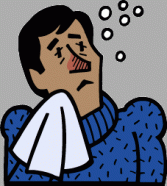Smiles Turn Away Colds
A good mood and a relaxed attitude help keep colds away.
By Emily Sohn
Want to stay away from colds? Put on a happy face.
Compared to people with bad attitudes, people who are cheerful and relaxed are less likely to suffer from colds, according to a new study. It’s possible that being upbeat helps the body fight illnesses, say the researchers from Carnegie Mellon University (CMU) in Pittsburgh.
“We need to take more seriously the possibility that a positive emotional style is a major player in disease risk,” says psychologist Sheldon Cohen, the study’s lead researcher.
 |
|
Being cheerful and relaxed can help a person stay away from colds. |
In a previous study, Cohen and his colleagues put cold-causing viruses into the noses of 334 healthy adults. People who tended to be cheerful and lively were least likely to develop sniffles, coughs, and other cold symptoms. People who showed positive feelings were also less likely to mention symptoms to their doctors, even when medical tests detected those symptoms.
Those findings were interesting, but they didn’t prove that a person’s attitude affects whether he or she gets sick. Instead, it was still possible that a person’s underlying personality is what matters.
Evidence suggests, for instance, that certain people are naturally more likely to be outgoing and optimistic, with high self-esteem and a sense of control over life. This would mean that who we are, not how we feel, ultimately decides our chances of catching colds.
To figure out which mattered more (personality or emotions), the CMU team interviewed 193 healthy adults. The researchers talked to each person over the phone every evening for 2 weeks. During the interviews, participants told the researchers about the positive and negative feelings they had experienced that day.
At the end of the interviewing period, people got nose drops that contained either cold or flu viruses. Then, each person stayed in an isolated room for 5 or 6 days.
The results showed that everyone in the study was equally likely to get infected. Their symptoms, however, differed depending on the types of emotions that they had reported over the previous 2 weeks.
Among those who reported good moods and had been infected with the flu virus, for example, 28 percent developed coughs and stuffy noses. On the other hand, those symptoms struck 41 percent of people who had been less upbeat.
In a related study, Cohen found that people who experience positive emotions might get a boost from a substance in the body called interleukin-6. This substance fights infections, and it seems to work more efficiently in cheerful people.
Scientists argue about whether negative emotions or positive emotions have a stronger impact on how healthy we are. For now, it can’t hurt to look on the bright side more often than not!—E. Sohn
Going Deeper:
Bower, Bruce. 2006. Sniffle-busting personalities: Positive mood guards against getting colds. Science News 170(Dec. 16):387-388. Available at http://www.sciencenews.org/articles/20061216/fob2.asp .
Sohn, Emily. 2005. Lightening your mood. Science News for Kids (April 27). Available at http://www.sciencenewsforkids.org/articles/20050427/Note3.asp .
______. 2004. Worlds of self-esteem. Science News for Kids (Sept. 1). Available at http://www.sciencenewsforkids.org/articles/20040901/Feature1.asp .
______. 2003. Fighting off micro-invader epidemics. Science News for Kids (Nov. 5). Available at http://www.sciencenewsforkids.org/articles/20031105/Feature1.asp .







